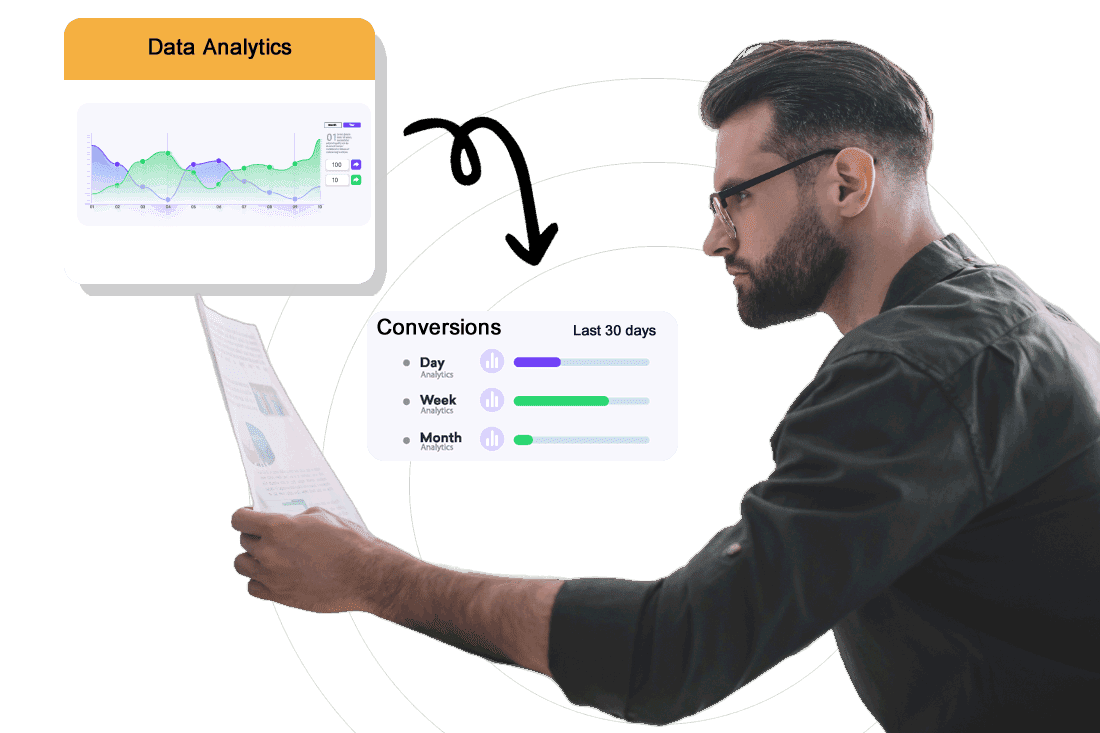Lead Generation with Web-Based Systems


Call-to-Action (CTA)
Compelling CTAs guide visitors to take specific actions, such as filling out a form, downloading a resource, or making a purchase. Well-crafted CTAs significantly influence conversion rates.
Social Media Integration
Leveraging social media platforms is integral to web-based lead generation. Integrating social sharing buttons and running targeted campaigns on platforms like Facebook, LinkedIn, and Twitter can expand a business's reach and attract a diverse audience
Search Engine Optimization (SEO)
Hosting webinars or participating in industry events, whether virtual or physical, can be powerful lead generation tools. These platforms allow businesses to showcase expertise and directly interact with potential leads.
Integrating with Customer Relationship Management (CRM)
Integration with CRM systems ensures a seamless transition from lead generation to lead nurturing and, eventually, conversion. CRM systems help businesses track interactions, personalize communication, and build long-lasting relationships with their customers.
Content Offers
Valuable and relevant content, such as ebooks, whitepapers, or webinars, serves as an incentive for visitors to provide their contact information. These content offers help establish credibility and showcase expertise.
Webinars and Events
Lorem ipsum dolor sit amet, consectetur adipiscing elit. In eu odio eros. Pellentesque tincidunt sit amet ipsum sed luctus. Aliquam consequat nec nunc eget euismod.

Understanding Lead Generation
Mechanics
Web-based lead generation operates on the principle of strategic online presence. Businesses establish an online footprint through websites, social media, and other digital channels to connect with their target audience.
Gathering Data
Data forms the backbone of effective lead generation. Web-based systems employ various methods to collect valuable information about potential customers.This data becomes a goldmine for tailoring marketing strategies and personalized communication.
Channels Utilized
The success of web-based lead generation lies in diversifying the channels used to connect with the audience. Social media platforms, including Facebook, Instagram, LinkedIn, and Twitter, serve as powerful tools for reaching a broad audience.
Content as the Catalyst
High-quality, relevant content is the linchpin of successful web-based lead generation. Content comes in various forms, including blog posts, articles, videos, and infographics. By offering valuable insights, solving problems, or addressing the needs of the target audience, businesses establish themselves as authorities in their respective domains, building trust and attracting potential leads.
Automation and Personalization
Automation streamlines repetitive tasks, such as sending follow-up emails, nurturing leads, and tracking user interactions. Integrating these processes into a CRM system helps businesses manage and analyze data effectively, enabling a more personalized approach to lead nurturing.
Positive Impact on Business
It enhances the efficiency of marketing efforts by focusing on qualified leads, reducing time and resources wasted on uninterested parties. It also facilitates targeted communication, allowing businesses to tailor their messages based on user behavior and preferences.
How Web-Based Systems Gather Data
-
Landing Pages and Forms: By creating optimized landing pages with compelling offers, businesses entice visitors to provide their contact information through forms. These forms typically ask for basic details like name, email address, and phone number, enabling companies to initiate personalized communication.
-
Content Marketing: Offering high-quality content, such as informative blog posts, e-books, or webinars, can attract visitors and encourage them to share their contact information in exchange for access. This method not only generates leads but also positions the business as a thought leader in the industry.
-
Social Media Marketing: With the pervasive influence of social media platforms, businesses can reach a vast audience and capture leads by strategically placing lead generation forms or enticing visitors to click on compelling ads.
-
Email Marketing: Building an email list through lead generation systems allows businesses to maintain ongoing communication with potential customers. By crafting targeted email campaigns, companies can nurture leads and guide them through the sales funnel.
-
Data Analytics and Tracking: Web-based systems employ sophisticated analytics tools to track user behavior, understand customer preferences, and gain insights into conversion patterns. This data helps businesses refine their lead-generation strategies and optimize their marketing efforts.

Conversion Tracking
Businesses can monitor specific actions users take on their website, such as filling out a form or making a purchase. This helps identify high-performing pages and optimize the user journey.
Form Submissions
Lead generation forms on websites collect user information, such as name, email address, and phone number. These forms are strategically placed on landing pages or within the website to encourage user engagement.
Tracking Pixels
These are tiny, invisible images embedded on web pages. They track user actions, such as page views or interactions with specific elements. Social media platforms and advertising networks commonly use tracking pixels.
User Surveys and Feedback
Surveys collect feedback directly from users. This helps in understanding customer preferences, pain points, and expectations. Monitoring and analyzing user-generated content on the website, such as reviews and comments, provides valuable insights into customer sentiment and preferences.
Social Media Analytics
Integration with social media platforms provides insights into user interactions, engagement, and demographics. Businesses can analyze social media data to identify potential leads and tailor their content accordingly.
Subscriber Lists
Email marketing platforms maintain lists of subscribers, tracking user interactions with emails, such as opens, clicks, and conversions. This data helps in segmenting audiences and sending targeted campaigns.

The Benefits of Lead Generation
-
Increased Conversion Rates: By capturing leads who have expressed genuine interest, businesses can focus their marketing efforts on a more receptive audience, resulting in higher conversion rates and improved return on investment (ROI).
-
Targeted Marketing Campaigns: With detailed customer data at their disposal, businesses can create personalized marketing campaigns tailored to specific demographics, interests, or behaviors. This targeted approach enhances customer engagement and boosts the likelihood of conversions.
-
Cost-Effective Strategy: Compared to traditional advertising methods, web-based lead generation systems can be more cost-effective. By focusing on capturing leads who are actively seeking information or solutions, businesses can optimize their marketing budgets and maximize their results.
-
Continuous Customer Engagement: Through email marketing and other communication channels, businesses can maintain ongoing engagement with leads. Regular updates, educational content, and personalized offers help nurture relationships, build trust, and increase the chances of converting leads into loyal customers.
-
Data Analytics and Tracking: Web-based systems employ sophisticated analytics tools to track user behavior, understand customer preferences, and gain insights into conversion patterns. This data helps businesses refine their lead-generation strategies and optimize their marketing efforts.
-
Scalability and Growth: Lead generation systems can scale with a business's growth trajectory. As the customer base expands, businesses can employ automation tools, CRM integration, and sophisticated analytics to manage and nurture a growing number of leads effectively.
Increased Revenue
Compared to traditional methods, web-based lead generation often proves more cost-effective. Digital channels offer targeted advertising, reducing wasted resources on audiences unlikely to convert.
Cost-Effective Marketing
Lorem ipsum dolor sit amet, consectetur adipiscing elit. In eu odio eros. Pellentesque tincidunt sit amet ipsum sed luctus. Aliquam consequat nec nunc eget euismod.
Enhanced Customer Insights
The data gathered through web-based lead generation provides invaluable insights into customer behavior, preferences, and trends. This knowledge empowers businesses to make informed decisions and tailor their offerings to meet customer needs.
Improved Conversion Rates
With personalized and targeted communication, businesses can nurture leads more effectively, increasing the likelihood of conversion. Automation ensures timely follow-ups and engagement, keeping the brand at the forefront of the customer's mind.
Competitive Edge
In an increasingly digital marketplace, businesses that leverage web-based lead generation gain a competitive edge. An effective online presence positions a company as forward-thinking and responsive to evolving consumer behaviors.
Measurable ROI
Unlike traditional marketing efforts that are often challenging to measure, web-based lead generation allows businesses to track and analyze the performance of campaigns in real-time. This data-driven approach enables a clear understanding of return on investment (ROI) and facilitates continuous optimization.
